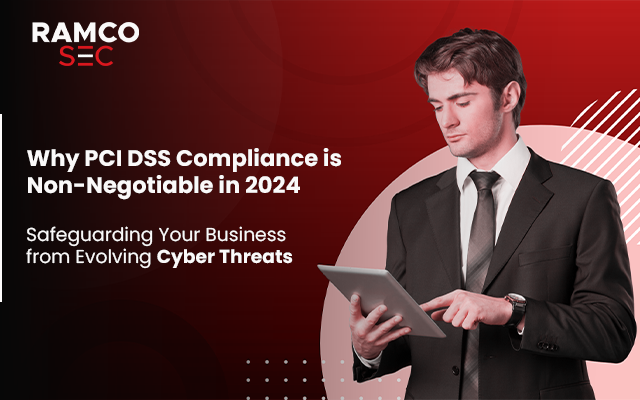Introduction
In the digital age, where online transactions have become the norm, safeguarding payment card information is paramount. The Payment Card Industry Data Security Standard (PCI DSS) is a set of security standards designed to ensure that all companies that process, store, or transmit credit card information maintain a secure environment. As we move into 2024, the importance of PCI DSS compliance has only grown, particularly in the face of evolving cyber threats targeting businesses of all sizes.
In this blog, we’ll explore why maintaining PCI DSS compliance is essential in 2024, discuss recent changes in the standards, highlight common pitfalls to avoid, and explain how a thorough QSA (Qualified Security Assessor) review from experts like Ramcosec can protect your business from costly breaches and fines.
The Growing Importance of PCI DSS Compliance in 2024
Cybersecurity threats have become increasingly sophisticated, and the financial sector is one of the most targeted industries. As cybercriminals continue to develop new tactics, ensuring the security of payment card data is more critical than ever. Here’s why PCI DSS compliance is non-negotiable in 2024:
- Rising Cyber Threats: The frequency and complexity of cyberattacks targeting payment card information are on the rise. From phishing attacks to sophisticated malware, cybercriminals are constantly finding new ways to breach security defenses. A failure to comply with PCI DSS can leave your business vulnerable to these threats, potentially leading to data breaches that could damage your reputation and result in significant financial losses.
- Regulatory Pressure: Regulatory bodies are increasingly scrutinizing organizations’ data security practices, particularly in the financial sector. Non-compliance with PCI DSS can result in hefty fines, legal action, and loss of the ability to process credit card payments. In 2024, the stakes are higher than ever, and businesses cannot afford to take compliance lightly.
- Customer Trust: In today’s digital economy, customers are more aware of data security issues than ever before. They expect businesses to protect their payment card information, and any breach of that trust can have long-lasting consequences. PCI DSS compliance demonstrates your commitment to safeguarding customer data, helping to build and maintain trust with your clientele.
- Business Continuity: A data breach can disrupt business operations, leading to downtime, lost revenue, and reputational damage. Ensuring PCI DSS compliance is a proactive measure that helps protect your business from these risks, ensuring continuity even in the face of cyber threats.
Recent Changes in PCI DSS Standards
The PCI Security Standards Council regularly updates the PCI DSS requirements to address emerging threats and reflect changes in technology. In 2024, businesses must be aware of the latest updates to ensure ongoing compliance:
- Enhanced Multi-Factor Authentication (MFA) Requirements: The latest version of PCI DSS places a stronger emphasis on multi-factor authentication, particularly for accessing systems that handle payment card information. Businesses are now required to implement MFA for all personnel with administrative access to the cardholder data environment.
- Increased Focus on Encryption: Encryption remains a critical component of protecting payment card data, both in transit and at rest. The updated standards require businesses to implement stronger encryption protocols, particularly when transmitting data over public networks.
- Third-Party Vendor Management: As more businesses rely on third-party vendors for various services, the updated PCI DSS standards emphasize the importance of managing these relationships. Businesses must ensure that their vendors comply with PCI DSS requirements and that appropriate security controls are in place to protect cardholder data.
- Continuous Monitoring and Logging: The latest PCI DSS updates highlight the importance of continuous monitoring and logging to detect and respond to security incidents in real-time. Businesses are required to implement robust logging mechanisms and regularly review access logs for signs of suspicious activity.
Common Pitfalls to Avoid in PCI DSS Compliance
Achieving and maintaining PCI DSS compliance can be challenging, particularly for businesses that lack the necessary expertise. Here are some common pitfalls to avoid:
- Incomplete Scope Definition: One of the most common mistakes businesses make is failing to properly define the scope of their PCI DSS compliance efforts. It’s essential to accurately identify all systems, processes, and personnel involved in handling payment card information to ensure comprehensive compliance.
- Neglecting Employee Training: Even with the best security measures in place, human error can still lead to data breaches. Many businesses fail to provide adequate training for employees on PCI DSS requirements, leading to potential vulnerabilities. Regular training sessions can help ensure that all staff members understand their role in maintaining compliance.
- Overlooking Third-Party Vendors: As mentioned earlier, third-party vendors can introduce risks if they do not adhere to PCI DSS requirements. Businesses must conduct due diligence when selecting vendors, obtain proper documentation of their compliance, and regularly assess their security practices.
- Failure to Implement Regular Updates: The cybersecurity landscape is constantly evolving, and so are the tactics used by cybercriminals. Businesses that fail to regularly update their security measures, such as patching software vulnerabilities and updating encryption protocols, are at a higher risk of falling out of compliance.
How Ramcosec’s QSA Services Can Help
Achieving and maintaining PCI DSS compliance requires a thorough understanding of the standards and a commitment to ongoing security efforts. At Ramcosec, we specialize in providing QSA services that help businesses navigate the complexities of PCI DSS compliance.
Our team of Qualified Security Assessors works closely with clients to:
- Conduct Comprehensive Assessments: We start by conducting a detailed assessment of your current security practices and identifying any gaps in compliance. Our experts will help you define the scope of your PCI DSS efforts and provide recommendations for addressing vulnerabilities.
- Implement Best Practices: Based on our assessment, we’ll work with you to implement best practices for securing payment card information. This includes everything from enhancing encryption protocols to training employees on security awareness.
- Manage Third-Party Risks: We understand the importance of managing third-party vendors and will help you ensure that all vendors involved in handling payment card data are compliant with PCI DSS requirements.
- Continuous Monitoring and Support: Compliance is not a one-time effort. Our team will provide ongoing support to help you monitor your systems, stay up-to-date with the latest security threats, and maintain compliance over time.
Conclusion
In 2024, PCI DSS compliance is more critical than ever as businesses face increasingly sophisticated cyber threats. By understanding the importance of compliance, staying informed about the latest updates, and avoiding common pitfalls, businesses can protect their payment card data and ensure the trust of their customers.
Partnering with a trusted cybersecurity firm like Ramcosec can make all the difference in achieving and maintaining PCI DSS compliance. Our expert QSA services are designed to help businesses navigate the complexities of compliance, protect against evolving threats, and safeguard their future in an ever-changing digital landscape.







